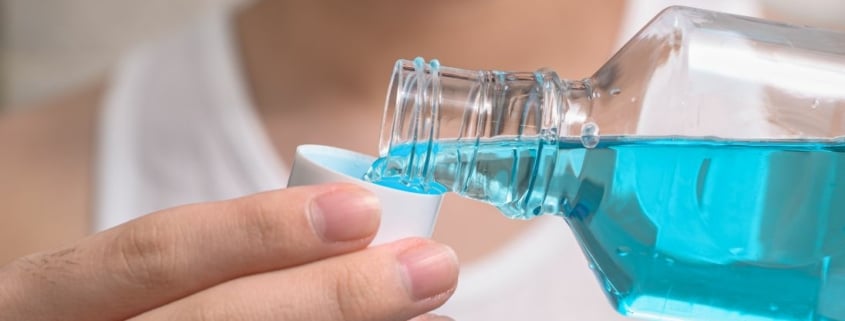The Dangers of Drinking Mouthwash
Many popular mouthwash brands contain alcohol. Although you are supposed to spit out the mouthwash and not drink it, people with alcohol use disorder (AUD) may be tempted to do so if they run out of alcohol and don’t have access to any more.
Drinking mouthwash is extremely dangerous due to its high alcohol content and additional toxic ingredients. People who drink mouthwash may even experience an overdose that has to be treated under medical supervision.
Why Do People Drink Mouthwash?
While it may seem harmless, some individuals resort to drinking mouthwash as an alternative to alcohol, either due to addiction or a misguided attempt to achieve a high. Mouthwash is very accessible and affordable, and it is a common household item found in bathrooms around the world.
One of the main reasons why people turn to mouthwash as a source of intoxication is its alcohol content. Many mouthwash products contain ethanol, a type of alcohol. The alcohol content in mouthwash can vary but typically ranges from 18% to 26%. To put this into perspective, a standard glass of wine contains around 12% alcohol, while beer usually contains 4-6%. Mouthwash, therefore, contains a significantly higher concentration of alcohol than many store-bought alcoholic beverages.
Understanding the Toxic Ingredients in Mouthwash
Mouthwash is not designed to be swallowed. In addition to alcohol, mouthwash contains a number of extremely toxic ingredients that can be harmful when ingested, including:
- Hydrogen peroxide – A mild antiseptic that may cause stomach irritation, nausea, diarrhea, and vomiting if swallowed.
- Ethanol (ethyl alcohol) – This is the type of alcohol found in alcoholic beverages, however, when formulated in mouthwash it is not meant to be ingested and can result in blood toxicity and overdose.
- Methanol (methyl alcohol) – A type of alcohol that is poisonous and in large quantities can cause blindness, organ failure, or death.
- Chlorhexidine gluconate – An antiseptic that may result in a sudden and dangerous increase in blood pressure if it is consumed orally.
- Methyl salicylate – This is the chemical responsible for the “minty-fresh” feel of mouthwash, however, when consumed it can cause rapid-onset salicylate poisoning which is a potentially life-threatening health condition.
Immediate Risks of Drinking Mouthwash
Drinking mouthwash can lead to immediate health risks, even after just a few sips. When ingested in large quantities, mouthwash can cause a range of adverse effects, including:
- Nausea and vomiting – The alcohol in mouthwash can irritate the stomach lining, leading to nausea and vomiting. This can result in severe discomfort and dehydration.
- Dizziness and disorientation – Ethanol affects the central nervous system and can cause dizziness, impaired coordination, and disorientation. These effects can be dangerous, especially if the person attempts to drive or operate heavy machinery.
- Respiratory issues – Ingesting large quantities of alcohol can depress the central nervous system to the point where it affects the body’s ability to breathe. This can be life-threatening.
- Hypothermia – Alcohol can lower body temperature, leading to hypothermia in some cases. This is especially concerning if the individual is in a cold environment.
Additionally, mouthwash contains a high concentration of alcohol, which means that even a small amount can lead to alcohol poisoning. Alcohol poisoning is a serious medical emergency that requires immediate attention. Symptoms of alcohol poisoning include confusion, seizures, slow or irregular breathing, and unconsciousness. Without prompt medical intervention, alcohol poisoning can be fatal.
Another important consideration is the potential interaction with medications. Drinking mouthwash while taking medications can have dangerous interactions. Alcohol can amplify the effects of certain medications or render them ineffective. It can also interfere with the body’s ability to metabolize drugs, leading to unpredictable and potentially harmful outcomes.
Symptoms of Mouthwash Overdose/Poisoning
It is possible to overdose on mouthwash. Symptoms include:
- Stomach pain
- Headache
- Slurred speech
- Impaired coordination
- Drowsiness
- Diarrhea
- Nausea and vomiting
- Dizziness
- Low blood sugar
- Low body temperature
- Low blood pressure
- Rapid heartbeat
- Shallow breathing
- Sore throat
- Loss of consciousness
- Coma
If you think you or someone you know has overdosed on mouthwash, call 911 or the poison help hotline immediately. Do not wait to seek help.
Long-Term Risks of Drinking Mouthwash
People who abuse mouthwash regularly may be at an increased risk of adverse effects. The ethanol in mouthwash is toxic to the body when ingested in large quantities. Continued consumption of mouthwash can lead to damage to internal organs, including the liver, kidneys, and gastrointestinal tract. Chronic alcohol abuse, even from mouthwash, can result in conditions like alcoholic hepatitis and cirrhosis of the liver.
Unfortunately, using mouthwash as a source of alcohol can lead to addiction. The high alcohol content in mouthwash can create a physical and psychological dependence on the substance. Individuals who resort to drinking mouthwash may find it difficult to quit or reduce their consumption, leading to a cycle of addiction that can have serious consequences for their overall health and well-being.
Drinking Mouthwash Has Negative Effects on Oral Health
Mouthwash’s primary purpose is to freshen breath and promote good oral hygiene. Ironically, drinking mouthwash can have a detrimental impact on oral health. While mouthwash is designed to promote good oral hygiene when used as intended, such as by gargling and spitting, ingesting it can lead to the destruction of oral tissues and the development of mouth sores. The alcohol in mouthwash can also dry out the mouth, increasing the risk of tooth decay and gum disease.
Alcoholism Treatment and Recovery
If you or someone you love are struggling with alcoholism and need support at any stage of your recovery, please contact us today. Our team is eager and willing to help you find the treatment and sober housing you need to be successful in your recovery journey.




Leave a Reply
Want to join the discussion?Feel free to contribute!